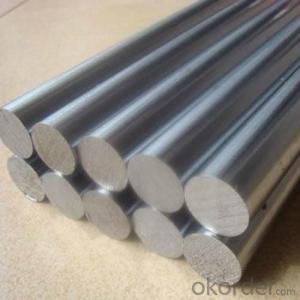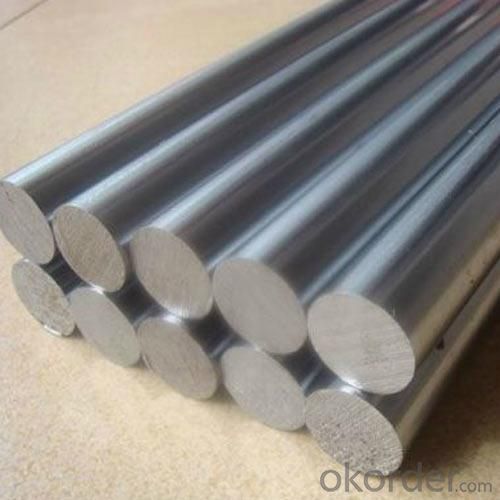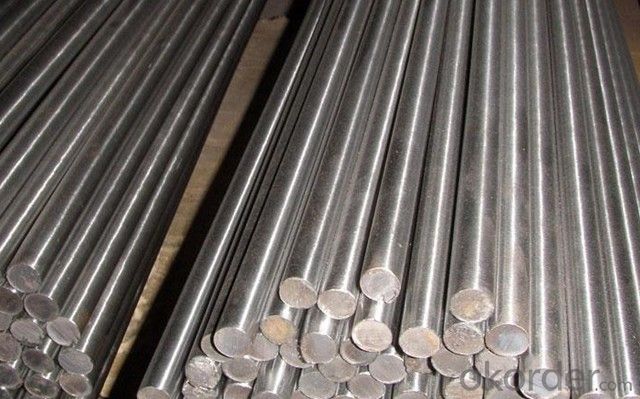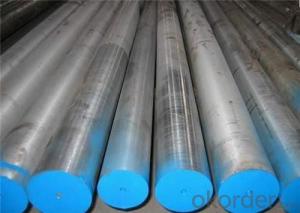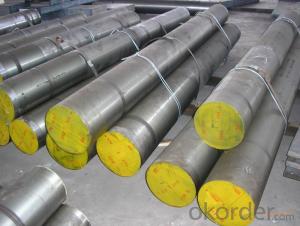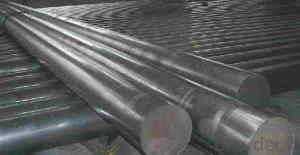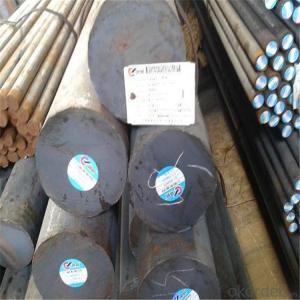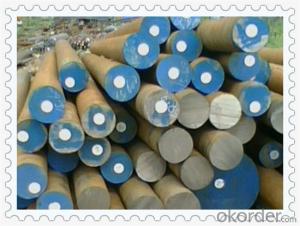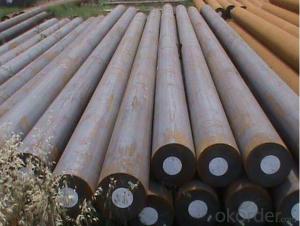Bearing steel SAE52100 / GCr15 round bars
- Loading Port:
- China main port
- Payment Terms:
- TT OR LC
- Min Order Qty:
- 500 m.t.
- Supply Capability:
- 10000 m.t./month
OKorder Service Pledge
OKorder Financial Service
You Might Also Like
Specifications:
1) Grade: Bearing steel SAE 52100 / GCr15 round bars
2) Diameter: 20-500mm
3) Hot rolled/forged, annealed
Application:
Commom steel used to produce balls and rings of bearing. The product has characteristics of uniform-chemical composition, low percentage of harmful elements, high purity, well-distributed carbide, good surface quality. It also has characteristics of wide scope of plastic,stable heat-treatment quality, uniformand high hardness, high wear resistance,high strength of touching fatigue. It has excellent machining property afer spheroidize annealing.
The use of products The product is used to produce balls and rings of bearing. Future Development By rational rolling and cooling process, the product can be spheroidized on-line and can be used in drawing and machining directly by customers. By combining re-spheroidize annealing and re-crystallisation of semi-finished product, the steel wire process can be simplified.
Packaging & Delivery
Mark: Heat No. will be cold stamped and Steel grade, diameter (mm), length (mm), and the manufacturer LOGO and weight (kg) is painted.
Standard seaworthy packing or as customer required
Delivery time: Within 30 days after order is confirmed.
- Q: How does special steel contribute to the toughness of products?
- Special steel contributes to the toughness of products in several ways. Firstly, special steel is known for its high strength and durability. It is manufactured using specific alloying elements and heat treatment processes, which enhance its mechanical properties and make it more resistant to wear and tear. This increased strength allows products made from special steel to withstand heavy loads, impacts, and harsh environments, making them tougher and less prone to breakage. Additionally, special steel has excellent corrosion resistance properties. This is achieved through the addition of specific alloying elements such as chromium and nickel, which form a protective layer on the surface of the steel, preventing rust and corrosion. The resistance to corrosion adds to the toughness of the products, as they can be used in corrosive environments without degradation or loss of performance. Special steel also offers improved heat resistance. It can withstand high temperatures without losing its structural integrity or mechanical properties. This is particularly important in industries such as aerospace, automotive, and energy, where components are exposed to extreme temperatures. The ability of special steel to maintain its toughness under high heat conditions adds to the overall reliability and longevity of the products. Furthermore, special steel can be customized to meet specific requirements. Manufacturers can tailor the composition and properties of the steel to suit the intended application. For example, different types of special steel alloys are used in the production of cutting tools, bearings, and structural components. By selecting the appropriate grade of special steel, manufacturers can optimize the toughness of their products, ensuring they can withstand the intended use and perform reliably. In conclusion, special steel contributes to the toughness of products through its high strength, corrosion resistance, heat resistance, and customizability. The unique properties of special steel make it an ideal material choice for a wide range of applications, where toughness and durability are crucial factors.
- Q: How is special steel produced?
- Special steel is produced through a meticulous process known as alloying, where different metals are combined with iron to enhance its properties. The alloying elements are carefully selected and added to molten iron, followed by precise temperature control and cooling to form the desired steel composition. This process ensures that special steel possesses superior strength, hardness, corrosion resistance, and other unique characteristics required for specialized applications.
- Q: What are the main applications of special steel in the power transmission industry?
- Special steel is used in various applications within the power transmission industry. Some of the main applications include manufacturing of power transmission line towers, transmission line conductors, and high-voltage insulators. Special steel is also used in the production of power transmission cables, transformers, and other critical components, ensuring efficient and reliable electricity transmission.
- Q: What are the different methods for improving the electrical conductivity of special steel?
- There are several methods for improving the electrical conductivity of special steel. One common method is through the addition of alloying elements such as copper or silver. These elements can help to increase the number of free electrons in the steel, thereby improving its electrical conductivity. Another method is by subjecting the steel to heat treatment processes such as annealing or normalizing. These heat treatments can help to refine the microstructure of the steel, reducing the presence of impurities and enhancing the movement of electrons. Surface treatments, such as electroplating or coating the steel with a conductive material like copper or nickel, can also improve its electrical conductivity. These treatments create a conductive layer on the surface of the steel, enabling better electron flow. Additionally, refining the grain size of the steel through processes like grain boundary engineering or severe plastic deformation can improve its electrical conductivity. Smaller grain sizes allow for more efficient electron movement and reduce scattering, leading to enhanced conductivity. Lastly, proper cleaning and removal of any surface contaminants or oxides can significantly improve the electrical conductivity of special steel. By removing impurities and ensuring a clean surface, the steel can have better contact and conductivity. It is important to note that the specific method used to improve the electrical conductivity of special steel will depend on the intended application and the desired level of conductivity. Different industries and applications may require different approaches to achieve the desired results.
- Q: What are the main alloying elements used in special steel?
- The main alloying elements used in special steel include chromium, nickel, molybdenum, vanadium, and tungsten.
- Q: What is the role of heat treatment in special steel?
- Enhancing the properties and performance of special steel is of utmost importance, and heat treatment plays a vital role in achieving this. Special steel refers to alloys that are deliberately designed to possess unique characteristics such as high strength, corrosion resistance, or heat resistance. To alter the microstructure of the steel and attain the desired properties, heat treatment involves subjecting it to controlled heating and cooling processes. Improving the mechanical properties of special steel is one of the primary functions of heat treatment. By carefully regulating the temperature during heating and controlling the rate of cooling, the steel's hardness, strength, and toughness can be greatly enhanced. For instance, procedures like quenching and tempering significantly increase the steel's strength and resistance to wear and fatigue. This makes it suitable for applications requiring high strength and durability, such as machinery, tools, or aerospace components. Heat treatment also plays a crucial role in optimizing the steel's resistance to corrosion. Special steel is frequently used in environments where it is exposed to harsh conditions like corrosive chemicals or high temperatures. By subjecting the steel to specific heat treatment processes like annealing or precipitation hardening, a more stable microstructure is developed, improving its resistance to corrosion and oxidation. This ensures that the special steel retains its structural integrity and performance even in challenging environments. Furthermore, heat treatment can modify the steel's heat resistance properties. Special steel often finds applications in industries where it is exposed to high temperatures, such as turbines or exhaust systems. Through heat treatment techniques like normalization or hardening, the steel can be made more resistant to deformation, cracking, or softening at elevated temperatures. This allows the special steel to maintain its strength and structural integrity even under extreme heat conditions. To summarize, heat treatment is crucial in optimizing the mechanical, corrosion resistance, and heat resistance properties of special steel. By carefully manipulating the steel's microstructure through controlled heating and cooling processes, heat treatment enhances its strength, durability, and performance, making it suitable for a wide range of demanding applications.
- Q: What are the limitations of special steel?
- Some limitations of special steel include its high cost and limited availability, as well as the difficulty in shaping and processing it. Additionally, special steel may have lower tensile strength compared to other materials and can be prone to corrosion if not properly maintained.
- Q: How does special steel contribute to reducing product maintenance requirements?
- Special steel contributes to reducing product maintenance requirements by offering superior strength, durability, and resistance to corrosion and wear. This means that products made with special steel are less likely to break, degrade, or require frequent repairs or replacements. Its high-quality properties enable longer product lifespans and enhanced performance, ultimately minimizing maintenance efforts and costs for users.
- Q: What is the role of chromium in special steel?
- Chromium plays a crucial role in special steel due to its unique properties and characteristics. It is primarily added to steel alloys to enhance their corrosion resistance, durability, and strength. One of the significant contributions of chromium is its ability to form a passive oxide layer on the surface of steel, known as chromium oxide. This oxide layer acts as a protective barrier, preventing the underlying steel from coming into contact with corrosive elements such as oxygen and moisture. This corrosion resistance makes chromium-containing steel highly suitable for applications in harsh environments, such as marine or chemical industries, where the material is exposed to corrosive agents. Furthermore, chromium also improves the mechanical properties of steel. It increases the steel's hardness, toughness, and wear resistance. This makes it valuable in manufacturing tools, machinery components, and other applications that require high strength and durability. Chromium also helps in retaining the steel's sharpness and edge retention, making it ideal for making high-quality knives and blades. Additionally, chromium is essential in heat-resistant steel alloys, as it significantly improves the material's ability to withstand high temperatures without losing its strength or shape. This makes it suitable for various applications, including turbine blades, exhaust systems, and aerospace components. In summary, chromium plays a vital role in special steel by enhancing its corrosion resistance, improving mechanical properties, and enabling it to withstand high temperatures. These properties make chromium-containing steel alloys highly versatile and valuable in a wide range of industries and applications.
- Q: What are the different methods of surface laser cladding for special steel?
- There are several methods of surface laser cladding for special steel, including powder-based laser cladding, wire-based laser cladding, and direct laser cladding. Powder-based laser cladding involves melting a powder material onto the surface of the steel using a laser beam. Wire-based laser cladding uses a wire feed system to deliver the material to be cladded onto the surface, which is then melted by the laser. Direct laser cladding directly melts the material onto the steel surface without the need for additional feed systems, making it a more efficient and precise method.
Send your message to us
Bearing steel SAE52100 / GCr15 round bars
- Loading Port:
- China main port
- Payment Terms:
- TT OR LC
- Min Order Qty:
- 500 m.t.
- Supply Capability:
- 10000 m.t./month
OKorder Service Pledge
OKorder Financial Service
Similar products
Hot products
Hot Searches
Related keywords
